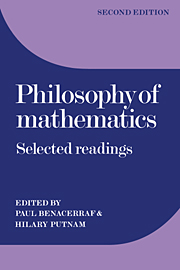Book contents
- Frontmatter
- Contents
- Preface to the second edition
- Introduction
- Part I The foundations of mathematics
- Symposium on the foundations of mathematics
- Disputation
- Intuitionism and formalism
- Consciousness, philosophy, and mathematics
- The philosophical basis of intuitionistic logic
- The concept of number
- Selections from Introduction to Mathematical Philosophy
- On the infinite
- Remarks on the definition and nature of mathematics
- Hilbert's programme
- Part II The existence of mathematical objects
- Part III Mathematical truth
- Part IV The concept of set
- Bibliography
Consciousness, philosophy, and mathematics
Published online by Cambridge University Press: 05 June 2012
- Frontmatter
- Contents
- Preface to the second edition
- Introduction
- Part I The foundations of mathematics
- Symposium on the foundations of mathematics
- Disputation
- Intuitionism and formalism
- Consciousness, philosophy, and mathematics
- The philosophical basis of intuitionistic logic
- The concept of number
- Selections from Introduction to Mathematical Philosophy
- On the infinite
- Remarks on the definition and nature of mathematics
- Hilbert's programme
- Part II The existence of mathematical objects
- Part III Mathematical truth
- Part IV The concept of set
- Bibliography
Summary
The … point of view that there are no non-experienced truths and that logic is not an absolutely reliable instrument to discover truths has found acceptance with regard to mathematics much later than with regard to practical life and to science. Mathematics rigorously treated from this point of view, including deducing theorems exclusively by means of introspective construction, is called intuitionistic mathematics. In many respects it deviates from classical mathematics. In the first place because classical mathematics uses logic to generate theorems, believes in the existence of unknown truths, and in particular applies the principle of the excluded third expressing that every mathematical assertion (i.e. every assignment of a mathematical property to a mathematical entity) either is a truth or cannot be a truth. In the second place because classical mathematics confines itself to predeterminate infinite sequences for which from the beginning the nth element is fixed for each n. Owing to this confinement classical mathematics, to define real numbers, has only predeterminate convergent infinite sequences of rational numbers at its disposal. Out of real numbers defined in this way, only subspecies of “ever unfinished denumerable” species of real numbers can be composed by means of introspective construction. Such ever unfinished denumerable species all being of measure zero, classical mathematics, to create the continuum out of points, needs some logical process starting from one or more axioms.
- Type
- Chapter
- Information
- Philosophy of MathematicsSelected Readings, pp. 90 - 96Publisher: Cambridge University PressPrint publication year: 1984
- 9
- Cited by



